Video-3: The
Prayer of a Muslim as the prophet (pbuh) prayed
About
this Video
How
to do Salah Prayer for Muslims
by Sheikh Adly .http://www.lightuponlight.com
The “Yoga” of Islamic Prayer
By Karima Burns, MH, ND
Each of the five prayer positions has a corresponding yoga position,
and the positions together "activate" all seven "chakras" (energy
fields) in the body. The idea of activating a chakra may sound
linguistically strange, but it is easier to understand once one
translates that word into more familiar language. Eastern healers
believe that each of the chakras correlate to major nerve ganglia that
branch forth from the spinal column. Thus, the concept of activating
these nerve centers is akin to getting a chiropractic adjustment or
installing a medical stimulating device on the spine to correct
corresponding bodily malfunctions. In layman's terms, the idea of
chakras can be understood by thinking about how the sense of "feeling"
functions. One notices, when touching any part of the body, that that
part responds by being more "awake" and aware. Another part of the body
that was not touched, but is along the same nerve pathway, may also
respond.
When a person is sitting, for instance, they may not be thinking about
their legs, which are momentarily at rest; however, if someone touches
them, they will again be "aware" of them. Chakras work in much the same
way. Studies have found that varying areas of the body, when activated
by touch, movement or thought, evoke specific emotional and physical
responses in much the same way that a smile can evoke the feeling of
happiness, and actually increase circulation – even if one was feeling
sluggish and unhappy before smiling. This is one of the reasons that it
is so important to perfectly perform all of the movements of the
Islamic prayer, rather than haphazardly rushing through them.
The Takbir and Al Qiyyam together are very similar to the Mountain Pose
in yoga, which has been found to improve posture, balance, and
self-awareness. This position also normalizes blood pressure and
breathing, thus providing many benefits to asthma and heart patients.
The placement of the hands on the chest during the Qiyyam position are
said to activate the solar plexus "chakra," or nerve pathway, which
directs our awareness of self in the world and controls the health of
the muscular system, skin, intestines, liver, pancreas, gallbladder and
eyes. When the hands are held open for du'a, they activate the heart
"chakra," said to be the center of the feelings of love, harmony, and
peace, and to control love and compassion. It also governs the health
of the heart, lungs, thymus, immune system,
Muslim researchers have shown that when Muslims recite the Qur'an, old
thoughts, feelings, fears and guilt are released or healed, and blood
pressure and stress levels are reduced. Virtually all of the sounds of
the Arabic language are uttered while reciting Qur'an, creating a
balance in all affected areas of the body.
Some specific sounds, in fact, correspond to major organs in the body.
In his research and creation of eurhythmy, Rudolph Steiner (founder of
the Waldorf Schools), found that vibrations made when pronouncing the
long vowels, 'A', 'E' and 'U,' stimulated the heart, lungs, and the
thyroid, pineal, pituitary, and adrenal glands during laboratory tests.
The position of Ruku is very similar to the Forward Bend Position in
yoga. Ruku stretches the muscles of the lower back, thighs, legs and
calves, and allows blood to be pumped down into the upper torso. It
The Sujud is said to activate the "crown chakra," which is related to a
person's spiritual connection with the universe around them and their
enthusiasm for spiritual pursuits. This nerve pathway is also
In Sujud, we also bend; thus activating the "base chakra," which
controls basic human survival instincts and provides essential
grounding. This helps to develop levelheaded and positive thinking
along with a highly motivated view of life, and maintains the health of
the lymph and skeletal systems, the prostate, bladder, and the adrenal
glands. We also bend the "sacral chakra" during Sujud, thus benefiting
and toning the reproductive organs.
The position of Al Qaadah, (or Julus) is similar to the Thunderbolt
Pose in yoga, which firms the toes, knees, thighs, and legs. It is said
to be good for those prone to excessive sleep, and those who like to
keep long hours. Furthermore, this position assists in speedy
digestion, aids the detoxification of the liver, and stimulates
peristaltic action in the large intestine.
Last, but not least, the "throat chakra" is activated by turning the
head towards first the right and then the left shoulder in the closing
of the prayer. This nerve path is linked to the throat, neck, arms,
hands, bronchials, and hearing – effecting individual creativity and
communication.
A
short Story (not part of the book - "Prophet's Prayer")
He
remembered his grandmother' s warning about praying on time:

